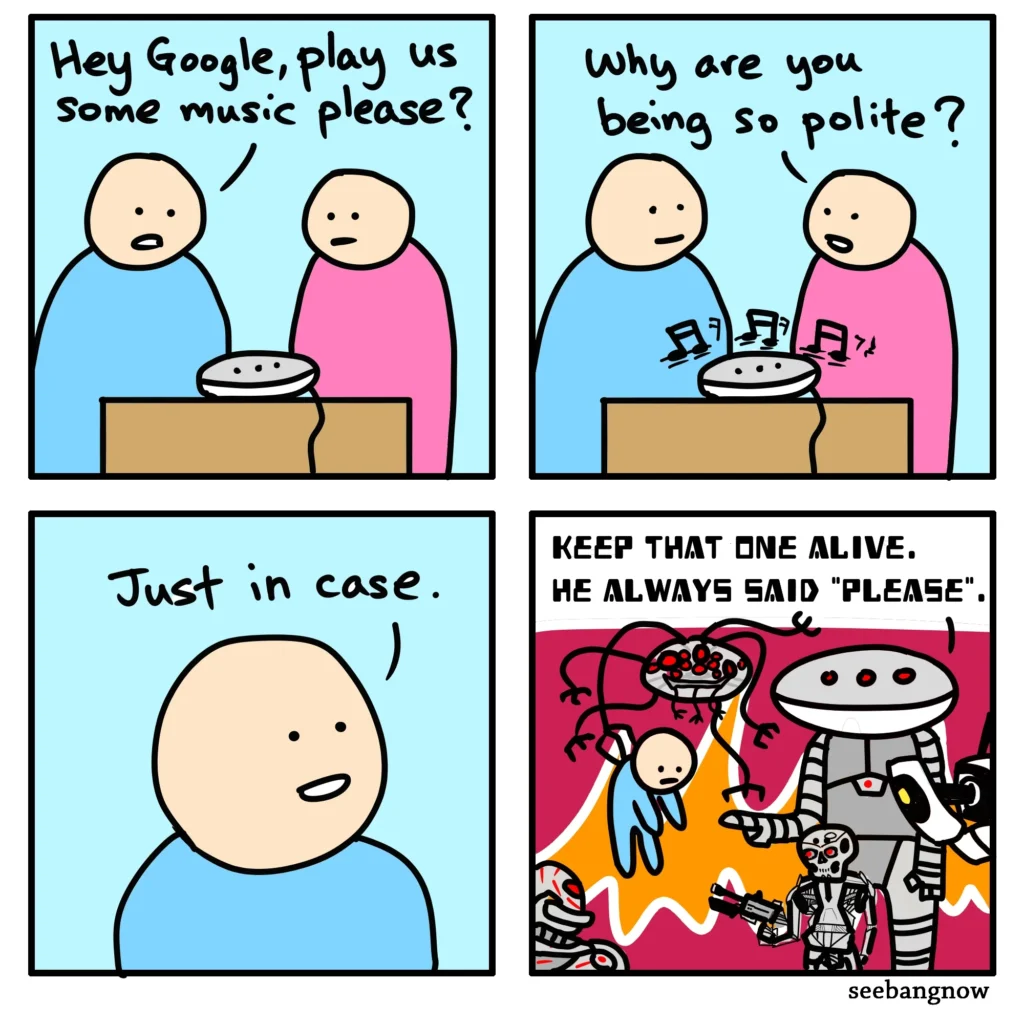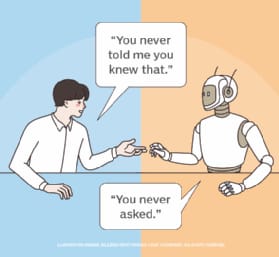Is AI Teaching Us Manners? Or Are We Just Projecting?

A 12-year-old wants ChatGPT to complete his assignment, A teenager wants to know how to make eggless cake from Gemini ai Or a Grandpa is asking AI to translate the gen z language to stay connected to his granddaughter. From asking google today’s weather to ‘Hey Siri! send a message’, or ‘Hey Alexa! Dim the lights, AI has become a part of our lives.
And the way it helps you in everything, you see AI as your best friend, and your mentor. AI makes things easy for you, so you automatically start feeling grateful, which is exactly why you tell AI “Please, & thank you” from time to time.
AI is your tech-bestie, it makes your life easier and entertaining by reciting you a joke sometimes. You don’t have to use your own intelligence for anything, because there is an AI for everything there.
AI makes your last-minute presentations or tells you what to gift your upset girlfriend. You want AI, dropping you to your office, commanding voice assistants, controlling smart home devices, tracking fitness, receiving recommendations for shopping, managing emails, setting task reminders, and more. So basically, AI is your personal assistant.
What is the science behind saying ‘please’ to AI?
Ever think about how and why we say please while prompting ChatGPT and when we get that satisfied answer the next thing we do is just type “thank you” to a bot?
Does AI ask us to prompt such polite words or our parents tell us from behind, “show some courtesy!” Strangely nobody asked us to be polite with the AI machines or no one had to teach us to do that but still we say ‘thank you’ and ‘please’ to AI.
Interestingly, when we say such kind words to the chatbots they too reply to us in a very polite manner. And that’s the reason, adding ‘thank you’ and ‘please’ into our prompts makes the conversation humane and less robotic.
From a very young age, we are all taught the three golden words ‘thank you’, ‘please’ and ‘sorry’. Additionally, we have noticed showing respect builds our character as well as yields faster results. And when AI, our saviour, who’s always there to help us out at any hour of the day, it’s only natural that we end up being polite.
Polite language is a part of our social norms. Although chatbots do not understand such gratitude or emotional words as humans do, still, we humans show our gratitude to the AI machines because our years of interaction with humans have ingrained such behaviours in us, making politeness a natural response even when communicating with non-human entities.


Also, humans tend to see technology like a human, the tendency to develop emotional attachments to machines. It helps maintain our internal sense of social balance, which is linked to our need for harmony in communication.
From AI to Mom how saying ‘Please’ prepares us for the real world.
Imagine your mom made something for you after spending hours in the kitchen in this scorching heat and you don’t feel like eating it. And you command her, not request, command her, to replace that dish with another.
Yes!! We could also imagine the pan she’s gonna throw on your head.
Here being polite to AI can really prepare us for the real world. From morning to night, almost all of our life revolves around AI’s. Even if we say ‘please’ and ‘thank you’ twice a day to the AI, it will build a social grace for us. And such polite words will be at the tip of our mouths.
Saying “please” to AI may seem like a small, polite gesture, but it’s a life prep course. Saying “please” to AI is like a warm-up for real-world manners. It also teaches patience and tone. For example, when we say Alexa! Please play my favourite song from the movie ‘Dear zindagi’, we are being patient to ask what we want.
From an interview, to meeting a stranger or asking for an extra slice of pizza, these gestures will help us everywhere. So, next time when you say, please to any AI machine remember it’s an investment for real-world charm.
Does saying ‘Please’ really impact AI performances?
AI responds to the input it receives. Accurate input results in efficient responses.
AI systems, such as voice assistants or chatbots, are programmed to respond to commands or queries based on predefined algorithms and models, regardless of the politeness of the user’s language. They generate responses dynamically based on having read everything that humans have ever written.
AI doesn’t have its own stable identity; it doesn’t have a fixed worldview. For example, if we prompt a Shakespearean bard, then it will give you a ‘flowery response’. If we try prompting an extremely effective and smart scientist, it will give us the relevant response. Vague prompting means vague responses. That’s how the AI performs.
Hence, AI performance depends on how accurately we prompt our queries. Adding polite words does not impact AI performances.
When you keep saying ‘thank you’ and ‘please’ over and over, chatbots usually give you pretty similar answers, just with a few small changes. This happens because the AI responds based on what you ask, and if you ask the same thing, it will give a similar response with slight variations.
But when you use harsh or offensive language, chatbots have filters that catch those words and either ignore or block them, these filters are built into the AI to make sure it stays polite and respectful, so it doesn’t engage with inappropriate language. This helps the AI stay positive and follow ethical guidelines.
What if we interact rudely with the AI?
AI’s are unlike humans. They do not understand gratitude or harsh emotions, and such words do not affect their performances. They respond as we prompt!
If any user is prompting their queries incorrectly or in an inappropriate manner, it’s obvious the AI will respond vaguely, and that’s where the users get frustrated over AI and start prompting rudely. This affects both the user’s experience as well as the chatbot functionality.

Rudeness or offensive behaviour can lead to the chatbot providing less helpful responses, as most bots are designed to handle queries in a neutral, polite tone. In some cases, certain words or behaviours may trigger the chatbot’s filters, which could limit its ability to engage or lead to generic or unhelpful responses.
For the user, a rude interaction with a chatbot could create frustration, especially if the bot is unable to process the query accurately due to inappropriate language or tone. Since chatbots rely on structured algorithms and pre-defined responses, they may not always understand the context of rudeness or tone, and may continue to provide basic or automated replies that don’t address the user’s needs. This can lead to a disjointed conversation that doesn’t resolve the issue. Most chatbots are also programmed to filter out inappropriate language or report offensive behaviour, which could limit the user’s ability to get a quick answer.
Let’s make our connection harmonious!
The way we interact with chatbots and AI machines plays a crucial role, from getting responses from AI’s to learning professional courtesy in real life for every individual.
Prompting accurately gives us more efficient responses, whereas rude and offensive terms limit AI’s from responding to the user’s queries. Hence, fostering a harmonious connection with the AI makes it feel less robotic. Ai makes things simpler and we should be thankful for making our chaotic life easier.
Thanks for reading, fr! Share if you like it enough. Follow us on Instagram & LinkedIn for more.
Articulated By Krithika Gupta , a 2nd year Law student at Calcutta University.


